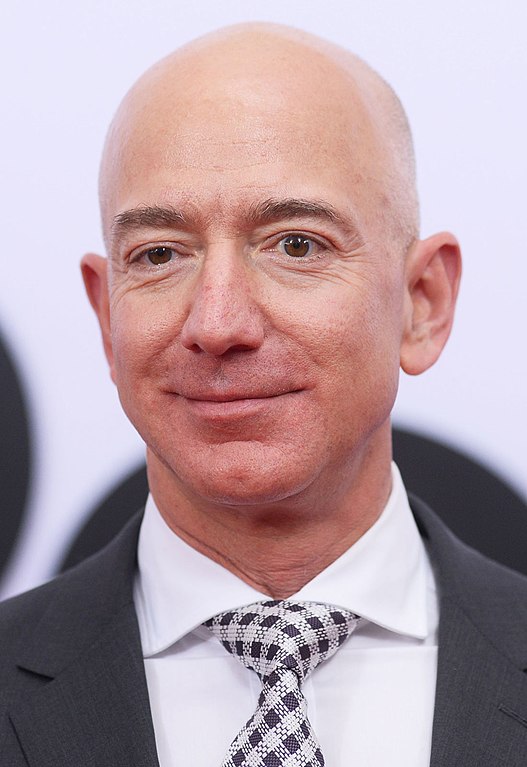Jeff Bezos and his climate pledge
February 23, 2020
As of late, students and teachers have discussed at length-or exhausted, according to some- the topic of climate change. This discussion has not taken place in isolation, . This Monday, Amazon CEO Jeff Bezos pledged to commit $10 billion to fight climate change, which he called “the biggest threat to our planet” in the Instagram post announcing this pledge.
The pledge is intended to go towards funding for scientists, activists, and nonprofit organizations involved in environmental work. “I want to work alongside others both to amplify known ways and to explore new ways of fighting the devastating impact of climate change on this planet.”, Bezos’ post explains. This donation has garnered significant support as well as surprise among the public- as the Amazon CEO has not made any significant donations in the past.
Significant criticism has arisen in response to the post. Many pointed out the fact that Amazon has a massive climate impact, which Bezos’ post failed to address. Amazon did, however, make a climate pledge this September to meet the Paris Agreement’s carbon neutrality by 2040 amid pressure from employees.
Bezos’ pledge is a prime example of the private sector becoming significantly involved in the effort against climate change. In the post, Bezos writes that preventing climate change is going to take “collective action from big companies, small companies, nation states, global organizations, and individuals.
The Friends community engaged directly with this issue earlier in the winter, when Weldin Dunn ‘20 and Pier Paolo Ergueta ‘22 debated the merits of a governmental centralization and mobilization in order to combat global warming. This was a debate hosted by the World Affairs Club and open to all in the library at lunch. Debater Pier Paolo recognized that this pledge was not consistent with his position in the debate: “I don’t believe it quite embodies the point I was trying to prove. The visionary mobilization I imagined was one led primarily by the government…What Bezos is attempting to do is simply raise all-around awareness on the issue, believing that unlead individual action is enough to solve the problem.” Yet, despite his views on the most effective methods to combat climate change combated, Pier Paolo was still excited by this event: “The entire day was lightened because of it, as it is a huge win.” It was clear that Pier Paolo was simply grateful progress was being made, regardless of whether. His opponent in the debate, Weldin Dunn, summed up this point: “Regardless of our debate positions, I know Pier Paolo and I are very happy to see large scale attention given to climate change. I know I appreciate the fact that while our government is doing nothing to slow down climate change and doing multiple things to speed it up, people still care about climate change and want to stop it.”
While certain WFS students are avidly discussing environmental issues, a large portion of the student body feels that the issue is somewhat exhausted. A combination of the aforementioned debate, the fall climate strike, and frequent communications from the umbrella club “Fridays For Future” tends to feel excessive to certain students, especially when they feel the majority of the school already believes climate change is a problem. Luke Fahey ‘20 had an opinion to share on this matter. “I’d say that while it (climate change) is an important problem that needs addressing, it needs to find interest organically, and these constant forced efforts just create artificial interest, which gets people less interested in the issue as a whole.” Friends students recognize the threat of climate change, but at times feel as if the constant engagement is forced and disingenuous.
Javier Ergueta, history teacher and faculty founder of Fridays For Future, was asked how he felt about those who feel that the climate issue is forced and worn out, he stated that, “Scientists tell us it’s not an issue that we can set aside. It’s a life-or-death issue for humanity, and it threatens the lives of all young people.”
Mr. Ergueta says he understands that students feel pressured. The climate crisis is a “bitter pill to swallow, and psychologists around the world report a surge in “Climate Grief” among young people, brought about by rising anxiety and fear”. But he says FFF has worked hard to make all of its activities voluntary: “No one was forced to go on the climate strike or to sign the pledge. It took a lot of work to structure our activities that way”. He says that he respects that some fellow WFS community members will choose not to take part in climate activities. “A chief FFF goal is to provide a wide range of optional projects to students, so that through constructive activity and fellowship they can overcome climate despair.”
Mr. Ergueta invites the WFS community to review the online lists of ongoing or completed FFF Projects and also of FFF New Project Ideas. “I think students should be very proud of what we’ve already achieved. I don’t know of any high school in Delaware that is doing more.” He also suggests a visit to the FFF Group page, for answers to many other questions about how to approach the climate crisis.
Bezos’ climate pledge came as good news to the many Friends students passionate about climate action, and serves to continue the discussion on climate issues and how the school should be engaging with them. While there might be slight disagreements, many students are happy simply to see progress being made.































